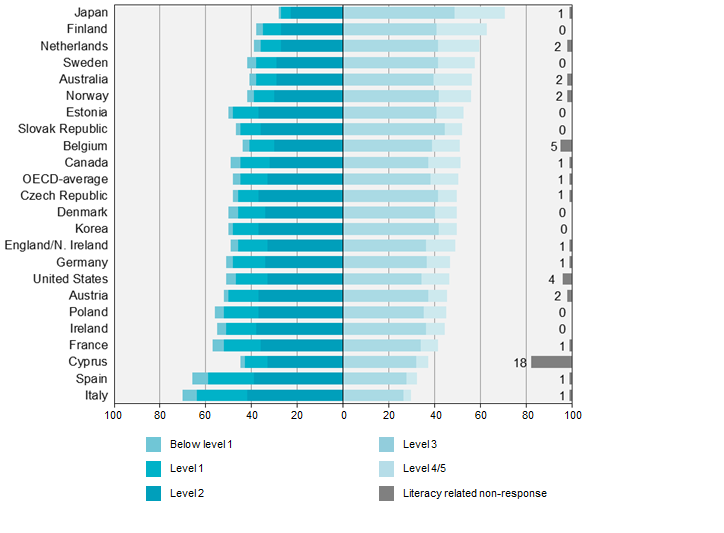PIAAC - Programme for the International Assessment of Adult Competencies:
Adult skills stand up well internationally
Statistical news from Statistics Sweden 2013-10-08 11.00
On a total scale, Sweden is above average for participating countries in the international survey PIAAC when it comes to literacy and numeracy, and in top place when it comes to problem solving with the aid of computers. At the same time, differences are considerable in the population. A rather large share lies at a low level within these areas of knowledge.
Sweden is one of 23 countries that have participated in an international survey of adult skills (PIAAC). It has been conducted to provide information about the extent of those adults in the population aged 16-65 who have the skills needed in society, and how these skills are used at work and at home.
Among adults in Sweden, the majority or 58 percent have a good level of literacy skills, corresponding to level 3 or above. In the participating OECD countries, an average of 50 percent of all adults have a good level of reading, but there are significant differences among the countries. The distribution of the different levels of knowledge for numeracy skills is similar to those for reading.
Differences among the Nordic countries occur regarding proficiency in literacy. The results from Sweden and Norway are comparable, while Finland has a larger share at a good level and Denmark a lower share than the other Nordic countries. The differences are small between the Nordic countries in the share of adults who have a good level of numeracy skills.
In addition, Sweden ranks highest regarding the share of adults with a good ability to solve problems with the help of computers. About 44 percent of the adult population is at proficiency levels 2 and 3, corresponding to a good level within problem solving. This is the highest share of all the countries. The average for participating OECD countries is 34 percent.
Young adults in Sweden aged 16-24 have better skills than the entire adult Swedish population when it comes to reading and solving problems, but are at about the same level concerning numeracy. Compared to the entire population of young adults in the participating countries, Swedish persons aged 16-24 are above average in numeracy and somewhat above the average in literacy.

Considerable differences in the Swedish population
While Sweden has a good position in the international comparison, there is a rather large share of the Swedish population who are at a low level in the different knowledge areas. This group consists of many with a short education and many foreign born persons. There is a risk that the groups with a low level of skills have worse possibilities to actively take part in working life and society.
The differences between the sexes are small when it comes to reading skills and even the ability to solve problems. However, there are differences in numeracy. Among Swedish women, 52 percent are at a good level (level 3 or higher), compared to 62 percent of the men. The same result is shown in total in the international comparison. In 18 of the 23 participating countries, the men have an advantage of more than 10 average points of a possible 500 points for numeracy skills.
Definitions and explanations
In the survey, basic skills for literacy, numeracy and problem solving are estimated. Within each area, the participating persons are given points on a scale from 0 to 500. The scales have been divided into different levels of proficiency, defined by set intervals of points and by level of difficulty. Six levels of knowledge are listed for literacy and numeracy, while there are four levels for problem solving abilities.
Publication
A more detailed report of this survey is published in a Theme Report.
Feel free to use the facts from this statistical news but remember to state Source: Statistics Sweden.
